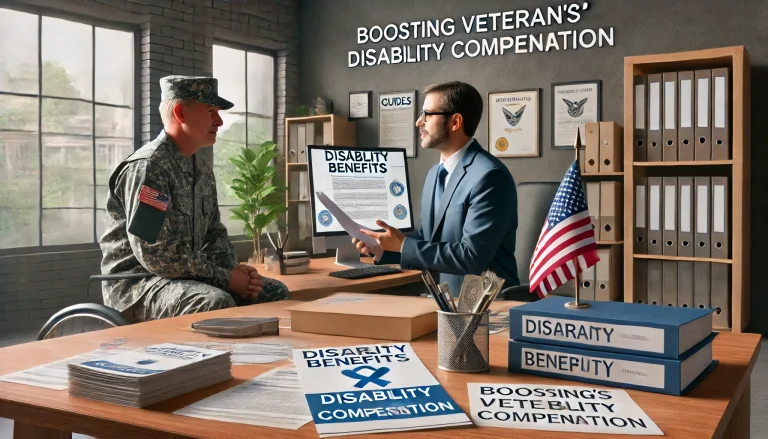Navigating the complexities of veterans’ disability compensation can be challenging. Understanding the benefits and processes involved is crucial for veterans seeking to maximize compensation. This guide offers practical tips and valuable resources to help veterans enhance their claims, understand eligibility criteria, and access support services. From gathering essential documentation to utilizing advocacy organizations, this introduction provides a roadmap to ensure veterans receive the benefits they deserve.
Key Takeaways:
- Understanding the basics of veterans’ disability compensation can help maximize benefits.
- Key steps and tips for increasing disability ratings.
- Resources for veterans to get additional help and information.
Understanding Veterans’ Disability Compensation
Veterans’ disability compensation is a crucial benefit provided by the Department of Veterans Affairs (VA) to service members who suffer from disabilities as a result of their service. Understanding how to increase VA disability rating can be a game-changer for their financial stability and access to healthcare. The compensation is designed to help veterans manage their healthcare needs, daily living costs, and other financial responsibilities from their service-related injuries or conditions.
Disability compensation is typically based on the severity of the disability, which is measured as a percentage. This percentage determines the amount of monthly benefits veterans receive. For instance, a veteran with a 30% disability rating will receive less compensation than one with a 70% rating. The more thorough the understanding, the better veterans can position themselves to maximize their benefits. Knowing how the VA determines these percentages and the evidence it considers is vital for veterans looking to increase their ratings.
Steps to Increase Your Disability Rating
Increasing your disability rating can significantly impact the benefits you receive. Here are some steps you can take:
- File a Notice of Disagreement: If you believe your initial rating was too low, file a Notice of Disagreement with the VA. This is the first formal step in appealing your rating. It’s essential to act promptly, as there are deadlines for filing this notice. Clearly articulate why you believe the rating is inadequate, providing any additional evidence or rationale that supports your claim.
- Gather Medical Evidence: Collect all relevant medical records and have thorough documentation of your condition. Detailed evidence can play a critical role in convincing the VA of the severity of your disability. This may include medical histories, doctor’s notes, diagnostic tests, and treatment plans. Ensure the documentation is current and accurately reflects your condition.
- Attend Medical Examinations: Ensure you attend all required medical evaluations and assessments. Missing an appointment can delay your case or result in a lower rating. VA-appointed physicians conduct these evaluations, assessing the extent and impact of your disability. Be honest and thorough during these examinations, communicating any pain, limitations, or effects on your daily life.
- Seek a Re-evaluation: If your condition worsens, request a re-evaluation from the VA to potentially increase your rating. Ensure that any progression in your condition is well-documented by a healthcare provider. Re-evaluations are critical because disabilities can deteriorate over time, and an updated assessment is necessary to reflect these changes accurately.
Common Pitfalls to Avoid
Many veterans face challenges when trying to increase their disability rating. Here are some common pitfalls to avoid:
- Incomplete Documentation: Ensure all paperwork and medical records are completed and submitted. Incomplete documentation can lead to delays or denials. Pay attention to detail and verify that all required forms are filled out correctly. Ensuring every piece of evidence is included can make your case more robust and persuasive.
- Missing Deadlines: Pay attention to all deadlines for filing and submitting appeals. A timely deadline can result in a lost opportunity for an increased rating. Keep track of all important dates, set reminders, and act promptly. Timeliness can be crucial in navigating the bureaucratic processes of the VA.
- Not Seeking Professional Help: Veterans’ advocates and organizations can provide valuable assistance in navigating the process. Don’t hesitate to ask for help. Legal experts, veteran service organizations, and support groups can offer guidance and support, helping you avoid mistakes and strengthen your appeal.
How Veterans’ Advocates Can Help
Organizations are dedicated to assisting veterans with improving their disability ratings. These advocates can provide expert guidance, help with paperwork, and offer personalized advice to ensure veterans receive the benefits they deserve. They can help you understand complex VA regulations, advise on the best steps to take, and provide representation or advocacy where necessary. Whether navigating complex VA regulations or providing emotional support, these advocates can make a significant difference.
Advocates often deeply understand the VA’s processes and can anticipate potential challenges. They can help you gather compelling evidence, prepare for hearings, and ensure that your case is effectively presented. By leveraging their expertise, veterans can significantly enhance their chances of success.
Conclusion
Understanding and navigating the complexities of veterans’ disability compensation can be challenging, but it’s crucial to ensure that veterans receive the benefits they rightfully deserve. By following the steps outlined in this article, veterans can take proactive measures to boost their disability compensation. Remember, utilizing available resources and seeking professional assistance can make a significant difference in maximizing benefits. The goal is to ensure that veterans who have sacrificed so much receive the support and compensation they need to lead healthy and secure lives.

